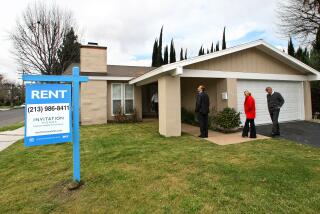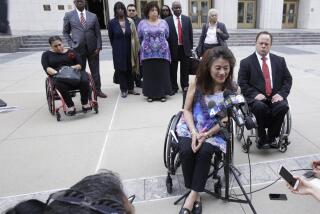HUD Going After Financing Markups and Kickbacks
WASHINGTON — In a move designed to shake up the real estate and mortgage financing fields, the nation’s top housing official has reached a series of settlements with major companies accused of paying illegal kickbacks and padding the closing costs of consumers buying homes.
Mel Martinez, secretary of the Department of Housing and Urban Development, warned the housing and finance industries a month ago that he is serious about cleaning up shoddy practices in real estate settlements. This week he started the cleanup: HUD collected $2.25 million in settlement agreements with home builders, mortgage lenders and realty service firms alleged to have violated federal anti-kickback and closing-cost-markup rules.
The settlements involved several well-known national firms, including Transamerica Corp., Conseco Finance Corp., First American Corp., Arvida/JMB home builders, as well as 38 commercial banks, credit unions and thrift institutions.
HUD officials emphasized in interviews that the settlement agreements are just the beginning of what will be a lengthy series of legal actions against firms found to be overcharging consumers and paying or receiving kickbacks for business referrals.
As part of the settlements, all of the companies agreed to cease the practices HUD investigators identified as violations of federal law, but admitted no wrongdoing. The bulk of the settlement money will go to housing counseling and educational organizations.
From his earliest weeks in office, Martinez, a lawyer by profession, has targeted excessive closing costs in mortgage and home-buying settlements as top priorities for reform. In mid-October he outlined federal policies designed to foster better disclosure and consumer understanding of financing fees charged by mortgage brokers.
He also warned lenders and others to stop the widespread practice of excessively charging consumers for credit report fees, appraisals, loan processing fees, courier expenses and other settlement costs. Under federal law, consumers pay only the actual costs of credit reports, appraisals and other closing-related expenses incurred by lenders. Fees cannot be marked up to provide additional profit for the lender or title company.
If an appraiser charges a home mortgage lender $275, in other words, the lender cannot bill you $350 at closing. If a lender pays $15 to check your credit, it is not permitted to bill you for $60.
In one of the settlement agreements, a mortgage lender was alleged to have padded the credit report fees of hundreds of customers during the past three years. The alleged excessive charges by Central Pacific Mortgage Corp. ranged from a few dollars per report to $50 per report, according to HUD lawyers. The alleged violations emerged after a federal audit of 21 of the company’s branch offices.
Other firms targeted by HUD were accused of providing free or reduced-cost services to induce illegal referrals of business. First American Corp., a diversified title and real estate closing services company, was alleged to have provided low-or no-cost flood and tax certifications to lenders on their portfolios of existing mortgages in exchange for exclusive referrals on new loans. Though the firm denied wrongdoing, it agreed to pay $1 million to nonprofit housing counseling organizations approved by HUD, plus another $200,000 in a settlement with the government.
Transamerica Corp. and its affiliates were alleged to have engaged in similar practices from the mid-1990s. Though the company denied wrongdoing, it agreed to pay $500,000 to consumer counseling groups, plus another $113,000 to federal authorities for the cost of the investigation.
Referral-fee arrangements such as those alleged to have been conducted by Transamerica and First American are difficult to detect, said HUD lawyers. Yet home buyers and mortgage borrowers ultimately pay for the kickbacks through high closing expenses.
The allegations against home builder Arvida/JMB were different from the others. Florida-based Arvida was accused of pocketing excess closing fees charged to its customers. It was also cited for requiring new buyers who declined to use Arvida’s affiliated title company to pay an extra $300 fee. Federal law guarantees consumers a choice of settlement service providers. Arvida agreed to end its disputed practices and to refund nearly $50,000 to consumers, according to settlement documents.
Settlement service providers have the right to be compensated, said Martinez, but they don’t have the right to collect illegal kickbacks and unearned fees.
This crackdown represents the first significant federal enforcement actions against home settlement abuses in more than a decade. HUD’s failure to pursue reports of widespread overcharges and kickback arrangements during the 1990s convinced many in the industry that they risked no prosecution when they routinely overcharged home buyers and refinancers, and brazenly paid kickbacks for business referrals.
Those days are now officially over.
*
Distributed by the Washington Post Writers Group.
More to Read
Inside the business of entertainment
The Wide Shot brings you news, analysis and insights on everything from streaming wars to production — and what it all means for the future.
You may occasionally receive promotional content from the Los Angeles Times.










